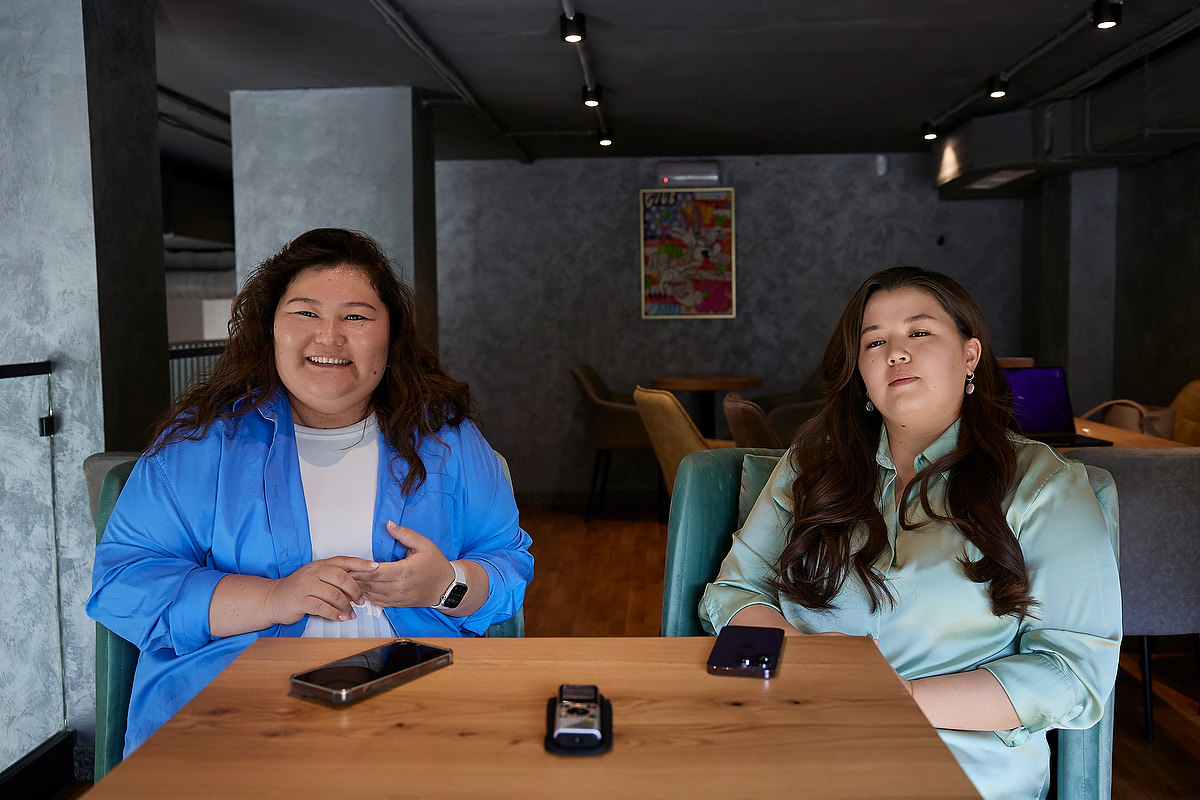Two Kazakhstani girls fulfill their dream startup: AI assistant for managers automating routine tasks

After completing her schooling, Aruzhan Mede headed to Barcelona, where she earned a diploma in finance and worked at the Hilton in Spain for 3.5 years. However, due to the coronavirus pandemic, she returned to Kazakhstan and joined BTS Education. Around the same time, Dinara Halitova, who had studied in Malaysia and worked in the tourism industry for 3 years, also joined the company.
Having ventured into the field of IT, in December 2022, the girls launched the IMPRO startup, which includes educational projects aimed at training IT specialists tailored to specific company needs. Currently, Aruzhan and Dinara are dedicated to developing a virtual AI-based assistant that will alleviate managers from a significant portion of their operational tasks. In their interview for the collaborative project of Digital Business and Astana Hub, titled “100 Startup Stories of Kazakhstan”, they discussed their journey into IT, their collaborations with prominent brands, and the anticipated launch date for the AI assistant.
“Even though we lacked prior entrepreneurial experience, we made the bold decision to venture into creating our own startup”
– Aruzhan, could you share your motivation for transitioning from the hotel industry to the field of IT after returning to Kazakhstan?
Aruzhan: – Upon my return from Barcelona, I distributed my CV to nearly all major hotel chains within our country, receiving job offers from each one. Simultaneously, I received an offer to join the Business Development Department at BTS Education. Their focus is on training IT professionals for diverse companies. Furthermore, in collaboration with Mastercard and the Ministry of Trade and Integration of Kazakhstan, they founded a school dedicated to electronic commerce for small and medium-sized businesses. The primary objective of this initiative is to assist entrepreneurs in enhancing their e-commerce skills.

Aruzhan Mede
The BTS mission strongly appealed to me. Moreover, during my tenure at Hilton, I held responsibilities for corporate client partnerships with companies like Mercedes, Aston Martin, Netflix, Disney, and others. My substantial experience collaborating with major enterprises motivated me to apply my expertise to this new field. The results were promising. In my first year with the company, we successfully provided digital-related training to three thousand entrepreneurs and over five thousand students.
– Dinara, could you please share your journey into the IT field?
Dinara: – After completing my MBA in Malaysia, I joined one of the top three tour operators in Kazakhstan. Over the course of nearly three years, I held various positions within the company, ranging from sales manager to product development manager. My responsibilities encompassed overseeing partnership projects between Kazakhstan and regions such as the UAE, Japan, and Southeast Asia.

Dinara Halitova
Due to the impact of the coronavirus pandemic, the tourism industry witnessed a significant downturn. It was during this period that I made the decision to explore new horizons and joined BTS Education as a project manager. My role primarily involved overseeing educational projects, particularly focused on training professionals in areas such as Java, iOS, Android development, DevOps, and Data Engineering for FinTech companies. I conducted approximately 300 interviews with experts to select mentors for this training program, and some of these mentors brought prior experience from notable corporations like Meta and Amazon.
– Did your aspiration to start your own business emerge while you were working at BTS Education?
Aruzhan: – You are right. Despite our lack of prior entrepreneurial experience, we made the decision to venture into establishing our own startup. Collaborating with Dinara, we delved into the operational facets of the educational services market and also built valuable networking connections.
As an example, we initiated contact with several prominent companies in Kazakhstan. We engaged with them to analyze their challenges, using this information to shape our training programs. Subsequently, we sought out lecturers and provided the necessary training to equip specialists who could readily begin working for our clients.
Given that Dinara and I managed all the processes ourselves, we opted to implement this model in our own startup, giving rise to IMPRO. All the partners we collaborated with expressed their interest in continuing the partnership.

– What was the response of the BTS Education management to your decision?
Aruzhan: – When we made the decision to launch our startup, the company had already begun a significant shift in its strategy. Commercial projects for corporate clients were no longer part of their strategic agenda.
“The quarterly revenue fluctuated around $30,000”
– Whom did you provide training to?
Dinara: – In the context of BTS Education, our primary focus was on training young specialists who lacked experience or specific skills required for employment. This primarily included 3-4 year students from IT faculties at universities in Kazakhstan and junior specialists.
The challenge lies in the fact that companies often require technically experienced professionals, especially when it comes to junior specialists. Such individuals are relatively scarce in the job market. Employers typically need to invest a considerable amount of time in training newcomers to work with the specific technological stack required. Additionally, not all employers have the necessary resources to provide comprehensive technical onboarding.

We approached corporations to understand their specific requirements for specialists and the key areas of focus needed during training. Following several stages of assessing both soft and hard skills, we carefully selected capable individuals. Over a period of three months, we provided training in a manner that minimized the company’s need to invest extensive time and resources in adapting new employees.
Additionally, we offered skill enhancement opportunities for the existing personnel. Our mentors are seasoned professionals, ranging from middle to senior levels, with substantial experience gained from international companies.
Aruzhan: – In the context of IMPRO, our approach was entirely tailored to the specific needs of the companies we served. For instance, our inaugural startup case involved delivering product management training to 30 employees from diverse teams at ForteBank. In essence, our emphasis was on preparing individuals for the product owner role.
– Besides ForteBank, who were your initial clients when you started?
Aruzhan: – Right from the start, we established a trusting relationship with Mastercard. We collaborated on several educational projects at the e-commerce school, which eventually led to them becoming our partners.

Currently, in partnership with Mastercard, we are in the process of launching the e-commerce school in Uzbekistan and are actively organizing the inaugural Central Asian e-commerce forum. We also worked with large Kazakhstan banks.
– How did you generate revenue?
Aruzhan: – Clients offered a specific grant amount for each specialist’s training or employee qualification enhancement. This model allowed us to operate as a successful business. Our quarterly revenue consistently ranged around $30,000. Recognizing the potential for substantial earnings, we made the decision to venture into development.
– What motivated your decision, given that you were consistently generating good profits?
Aruzhan: – Project-based work of this nature isn’t a scalable endeavor. Essentially, it’s akin to running an IT school. We already had a clear understanding that we couldn’t serve more than five clients simultaneously. If we wanted to increase their number, we’d have to hire additional personnel, which would inevitably escalate the volume of operational work. While our entire team was deeply committed to each project, the constraints of limited resources remained a constant challenge.

Furthermore, right from the outset, we aspired to become a technology-driven startup and immerse ourselves in the world of entrepreneurship. Thus, we made the decision to venture into development concurrently with our educational programs. As we trained and supported IT specialists, the concept of an AI-based virtual assistant emerged. Why did we pursue this idea? To address the challenges faced by team leads.
“On average, an employee dedicates approximately 350 hours per year to tasks such as preparing post-meeting notes, task allocation, and other routine activities!”
– What is the core purpose of the virtual assistant?
Dinara: – The virtual assistant essentially serves as an additional member of the product or project team, capable of managing various operational and organizational tasks.
For instance, it can join conference calls, transcribe all audio into text, and subsequently provide a concise summary of the discussion points to ensure no critical details are missed. It also has the capacity to distribute tasks among team members efficiently, particularly when equipped with information about each employee’s workload, and it can proactively notify you of impending deadlines.
Aruzhan: – Furthermore, the virtual assistant effectively addresses the issue of incomplete agreements. In some instances, during a conference call, a critical problem may be discussed, a decision to resolve it may be made, but there might not be a clear assignment of responsibility. Consequently, a week may pass, and the task remains unresolved because everyone assumes it’s someone else’s responsibility. This scenario is prevented by the virtual assistant, which promptly signals when no responsible person has been assigned to a task.
– What is the business impact of having such an assistant?
Aruzhan: – We’ve assessed that, on average, an employee allocates around 350 hours per year to activities like creating post-meeting notes, assigning tasks, and handling routine activities. This incurs significant financial expenses for the company.

Additionally, we intend to incorporate features into the virtual assistant that enable the tracking of each employee’s productivity. For instance, it will provide insights into the number of tasks an employee resolves in a given month, the complexity of these tasks, and their economic impact. This functionality will facilitate team optimization and enable a focus on harnessing the full potential of each employee.
– What is the current state of progress for your solution?
Dinara: – We are actively developing our MVP and currently in the process of testing the alpha version with ten product teams within FinTech companies. This testing phase is crucial for the problem-solution fit. Encouragingly, the feedback we’ve received thus far has shown promising results, with expressed interest in acquiring our solution.
Currently, we are self-funding our venture. Simultaneously, we are maintaining our educational projects. Our ideal scenario involves showcasing initial traction and securing a $400,000 investment during the pre-seed round, at an estimated valuation of $4 million. This would enable us to embark on significant development efforts.
This approach will enable us to offer a fully functional solution to other corporations, and our aim is to accomplish this objective by the end of the year.
– Are you relying on your own efforts for the development process?
Dinara: – Currently, we are outsourcing the development, but we are actively in the process of building a comprehensive in-house team. Customization is essential for larger corporations, as processes can vary significantly across different organizations.
Aruzhan: – We are also keen on catering to the SMB segment. They might have an even greater demand for team-based process automation compared to larger corporations. This can lead to significant resource savings for them.

– Is the virtual assistant exclusively designed to assist product teams?
Dinara: – No, in the future, we envision its use extending to sales teams as well. It will track negotiations, review scripts, and conduct analyses to identify areas where employees have performed effectively and where alternative approaches might be considered. This analytical capability has the potential to enhance efficiency and improve sales conversion rates.
– Considering the need for customization, even within the Kazakhstan market, does this solution have the potential for scalability?
Aruzhan: – I’m confident it does. This is because it’s built on a unique technology that can be adjusted slightly to align with the specific requirements of a particular company. It’s equally applicable whether the company is located in Kazakhstan or Southeast Asia.

Currently, our focus is on addressing confidentiality and data storage considerations. We envision that all data will be stored on the company’s servers. However, it’s important to note that this is still in the hypothetical phase. Our immediate priority is to launch the product, and then we will proceed to engage with a broader spectrum of market players.
